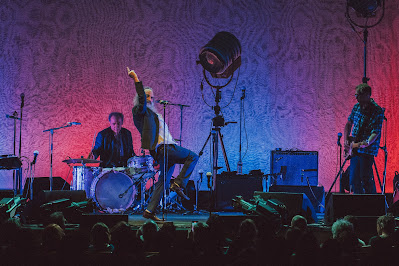By the time Juice Webster and her band arrive on stage, the room is three-quarters full and at least ten degrees warmer than Northcote's crowded High Street. As the applause dies down, I hear one woman standing near me whisper, “I love her look, I love her music, I love everything about her.” Since Webster’s arrival on the Melbourne music scene in 2018 as a quietly observant folk pop singer-songwriter, and long before the release of her glowingly reviewed debut album Julia late last year, the Melbourne-based singer songwriter has been growing used to sentiments like these. The audience go from raucous appreciation to a hushed reverence as her band ease into the album's opening track, Returning. Quietly insistent shallow guitar strums are underpinned by a warm rhythm section that moves at the pace of a sleeper’s heartbeat. Last year, Webster featured on Victoria Kozbanis’s podcast Beers & Tears, where the Kozbanis described her music as "a kind of summoning – soft echoes of connectedness and courage; lightweight and all-encompassing", and I'm not sure anyone is going to beat that. There is a virtue in Webster's choice not to lean on dynamic shifts and instead favour a soothing circuitous jangle. Standouts from tonight's set include the quietly incandescent Black Coat, Black Skirt and Headaches, both of which appear on Julia and the almighty, time-shifting closer Wanna Be Held, a song just waiting to make a music supervisor look like a complete genius when they use it to transform the climax of a romantic drama into a wrenching tear-jerking masterpiece. Webster won fans with her support slots for The Beths and her recent free Northcote Social Club show, it's a safe bet she's added to that number tonight.
There are few fans a band would want more than Mac McCaughan and Laura Ballance. The duo behind the nineties indie titans Superchunk and founders of Merge Records, McCaughan and Ballance discovered bands like Arcade Fire, Neutral Milk Hotel, Spoon and Caribou and the act they want to work their savvy magic with next is the quartet ambling onto stage right now. Quivers mumble bashful hellos to the buoyant room, now packed, spilling into the hallway and bellowing back their appreciation, the four-piece share a nod and launch into Gutters of Love. This turns out to be one of few songs played from Golden Doubt, their 2021 album they toured to great response overseas. Golden Doubt could be mined for a dynamite crowd-pleasing set. Instead, in what seems a bold sign of confidence, the band perform their forthcoming album in its entirety. Anyone wondering why Quivers, whose local profile sits somewhere between the equally excellent The Maggie Pills and Gut Health, were selected by Merge Records, need only listen to the title track and first single from this album, Oyster Cuts. Sung by bassist Bella Quinlan who, along with drummer Holly Thomas, takes a far more prominent role on the new album, the song epitomises many of the album's strengths. Guitars are muted and chug with an authority that allows the melodies to layer and float with a sense of freedom. It's as much a vibe as it is a pop song.
Unlike a lot of music that has writers and reviewers reaching to bands like The Go-Betweens and REM to describe their music, Quivers are unabashedly unpretentious. From their music to their between-song chat to the way that singer and guitarist Sam Nicholson seems surprised whenever his sequencer works, you don't get the impression they're doing this on a gap year or to blow off steam until they get through their MBA. You do get the impression they'll be doing this at 60. Songs are built around a sincere confession, some deft yet unpretentious wordplay and a chorus that ends in a singalong that isn't the least bit church-y. Whether it's the regional Tasmanian roots, that they have spent countless evenings eking out a living in what feels like the dying days of the live music scene or that they have a devotion to guitar pop music, they feel unaffected and wholly themselves. There is also a pure sense of joy that comes from the stage when Quivers play. It's there when Quinlan and Thomas share a glance while hitting harmonies on the chorus of new songs Screensaver or Never Be Lonely, in their euphoric cover of Lucinda Williams' I Just Wanted to See You So Bad and when they lock in to anchor three of the greatest pop songs of recent years When it Breaks, Hold You Back and You're Not Always on My Mind. It's also there in Nicholson's dorky enthusiastic one-foot dancing and when guitarist and backing vocalist Michael Panton peels off another guitar break that ends with his right hand a blur and his left hand slipping up and down the neck of his guitar. "This next song is our last," says Nicholson. "It's a song that could fall apart… or it could fly," Of course, it flies. While they close with Reckless, the last song from Oyster Cuts, Nicholson reminds us that this isn't the album's launch. “That'll be in November,” he says. Between now and then the band will be touring the US. That these songs could sound even better for that show is a pretty exciting thought.






